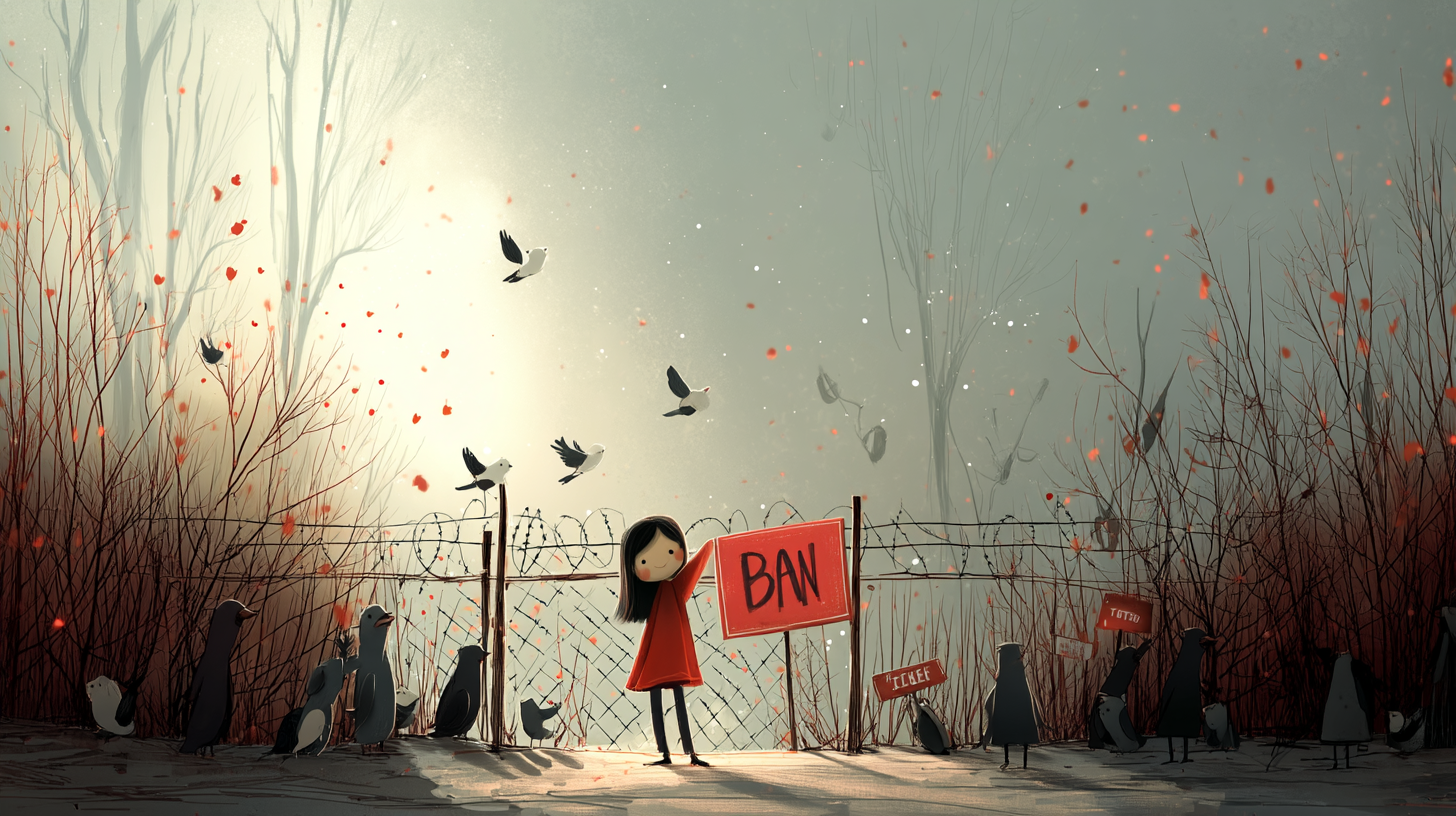“Ban” means to officially stop or not allow something.
「ban」は何かをしてはいけないと決めて止めることです
以下は英単語 “ban” に関するストーリー型学習コンテンツです。まずは大枠の意味を理解して最後の文章で確認しましょう。
主な意味(main meaning)
| 品詞 | 意味 | 発音記号 | 例文 |
|---|---|---|---|
| 動詞 (verb) | 禁止する | /bæn/ | The school banned smoking on campus. |
| 名詞 (noun) | 禁止(令) | /bæn/ | There is a ban on plastic bags in this city. |
語源(etymology)
「ban」は古ノルド語の「banna(命令する・呪う)」に由来し、何かを公的に「禁じる・排除する」イメージを持っています。
類義語(synonyms)
| 類義語 | 例文 |
|---|---|
| prohibit | The law prohibits drinking in public. |
| forbid | My parents forbid me to stay out late. |
| outlaw | The country outlawed the use of certain chemicals. |
| restrict | The school restricts phone use during class. |
| bar | He was barred from entering the building. |
反義語(antonyms)
| 反義語 | 例文 |
|---|---|
| allow | They allow pets in this apartment. |
| permit | The company permits employees to work from home. |
コロケーション(collocations)
| コロケーション | 例文 |
|---|---|
| ban smoking | The restaurant bans smoking inside. |
| impose a ban | The government imposed a ban on fireworks. |
| lift a ban | The city lifted the ban on outdoor events. |
| total ban | There is a total ban on alcohol in this area. |
| ban from | He was banned from driving for six months. |
2項表現(binomials)
| 2項表現 | 例文 |
|---|---|
| ban and restrict | The school decided to ban and restrict online games during study time. |
| allow and ban | Some countries allow certain drugs, while others ban them completely. |
英語ストーリー(english story)
Title: “The Banned Phone”
Tom loved using his phone at school, especially during lunch breaks. But one day, the principal announced a new rule. “We will now ban (禁止する) phone use during school hours,” he said. A loud groan filled the cafeteria.
The reason for the ban (禁止) was clear. Students were spending too much time on games and not talking to each other. The school wanted to help students focus and build better friendships.
At first, Tom was angry. He thought it was unfair to restrict his freedom. But after a week, he noticed something. Students were playing sports, talking, and laughing more. Even he started enjoying chess during lunch.
Later, the student council asked the school to lift the ban for special days like school festivals. The principal agreed, showing that rules could be flexible.
Tom learned that sometimes a prohibition can lead to unexpected benefits. He didn’t love the rule, but he began to understand its purpose.
和訳
タイトル:「禁止されたスマホ」
トムは学校でスマホを使うのが大好きでした。特に昼休みにはよく使っていました。しかしある日、校長先生が新しいルールを発表しました。「これから、授業時間中のスマホ使用を**ban(禁止)**します」と言いました。カフェテリアには不満の声が響きました。
**ban(禁止令)**の理由は明らかでした。生徒たちはゲームに時間を使いすぎて、会話をしなくなっていたのです。学校は、生徒同士がもっと話したり集中したりするようにしたかったのです。
最初、トムは怒りました。自由を**restrict(制限)**されるのは不公平だと思ったからです。でも1週間後、あることに気づきました。生徒たちはスポーツをしたり、話したり、笑ったりするようになっていました。トム自身も昼休みにチェスを楽しむようになっていました。
その後、生徒会が、学校祭のような特別な日には**ban(禁止)をlift(解除)**してほしいと学校にお願いしました。校長先生はそれに同意し、ルールにも柔軟性があると示しました。
トムは、**prohibition(禁止)**が思いがけず良い結果を生むことがあると学びました。ルールは好きではなかったけれど、その意味を理解し始めたのです。
Q&A
Q: 「ban」と「prohibit」の違いは何ですか?
A: 「ban」は日常会話やニュースでもよく使われる一般的な表現で、「禁止する」という意味です。「prohibit」はよりフォーマルな語で、法律や規則など公式な場面での禁止に使われることが多いです。
Q: 「ban」と「forbid」の違いは何ですか?
A: 「forbid」は人が他人に対して禁止する時によく使われます。例えば、親が子どもに「遅くまで出かけてはダメ」と言うような場面です。「ban」はルールや制度としての禁止に使われる傾向があります。
Q: 「ban」と「outlaw」の違いは?
A: 「outlaw」は法律で正式に「違法」とする意味です。たとえば、「ある薬を違法化する」という時に使います。「ban」は法律に限らず、ルールや政策などで使われる柔らかめの表現です。
Q: 「ban」と「restrict」の違いは?
A: 「restrict」は「制限する」という意味で、完全には禁止せず、条件をつけて使わせる場合に使います。「ban」は全面的に禁止する意味です。例えば、「夜8時以降のスマホ使用を制限」なら「restrict」、「スマホ全面禁止」なら「ban」です。
Q: 「ban」と「bar」の違いは?
A: 「bar」はある人の行動や立ち入りなどを物理的・制度的に「妨げる」ことに重点があります。例えば「彼は試合への参加を禁じられた」は「He was barred from the match.」のように使われます。「ban」はより広く「使用や行動自体を禁止する」ニュアンスです。
Q: 「ban smoking」と「prohibit smoking」の違いは?
A: どちらも「喫煙を禁止する」ですが、「ban smoking」はより自然で口語的、「prohibit smoking」は法律や看板などのフォーマルな場面で見られます。
Q: 「impose a ban」と「enforce a rule」は違いますか?
A: 「impose a ban」は新しく禁止を「導入する」こと、「enforce a rule」はすでにあるルールを「実際に守らせる」ことに重点があります。ニュアンスが異なります。
Q: 「lift a ban」と「remove a restriction」の違いは?
A: 「lift a ban」は一度完全に禁止されていたものを再び許可すること、「remove a restriction」は一部の制限をなくすという柔らかめの表現です。



コメント